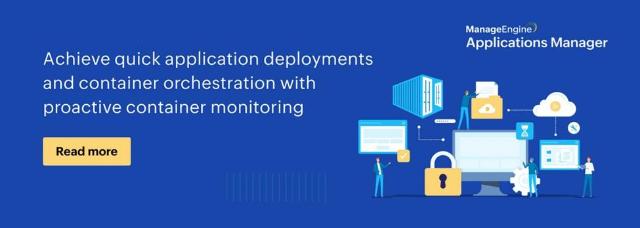Achieve quick application deployments and container orchestration with proactive container monitoring
Containers are self-contained units of software that include application code along with all necessary dependencies, libraries, and components needed for the code to run smoothly in any environment. They simplify distribution and deployment by packaging everything required for the application to function, without the need for extra infrastructure. While container infrastructure continues to grow and is used by organizations across the globe, it also poses a set of management challenges and can create unnecessary issues if left unattended. To overcome these challenges, having a robust container monitoring solution in place is crucial to ensure enhanced container application performance.
What is container monitoring?
Container monitoring is the ongoing process of monitoring the health, performance, and availability of containers to ensure that applications running on them operate smoothly. It allows for the constant monitoring of container functionality by tracking key performance indicators (KPIs) and promptly alerting IT admins about any abnormalities, ensuring the seamless operation of containerized applications and microservices environments.
Why is container monitoring important?
Having well-maintained containerized infrastructure is essential in today's app development landscape to guarantee the reliability and availability of applications. Containers, being lightweight and system-independent, are the preferred method for quickly hosting software products in response to market demands and updates. Any decrease in performance within a containerized environment can significantly disrupt application development and deployment, leading to widespread consequences for businesses globally.
Despite the complex nature of containers, monitoring the performance of your containerized infrastructure is crucial for ensuring optimal application deployments and meeting service-level agreements. This includes tracking resource utilization metrics and platform-specific metrics in real time to guarantee top-notch performance and seamless functioning of applications. Implementing a reliable container monitoring solution is essential for this purpose.
What are the challenges in container monitoring?
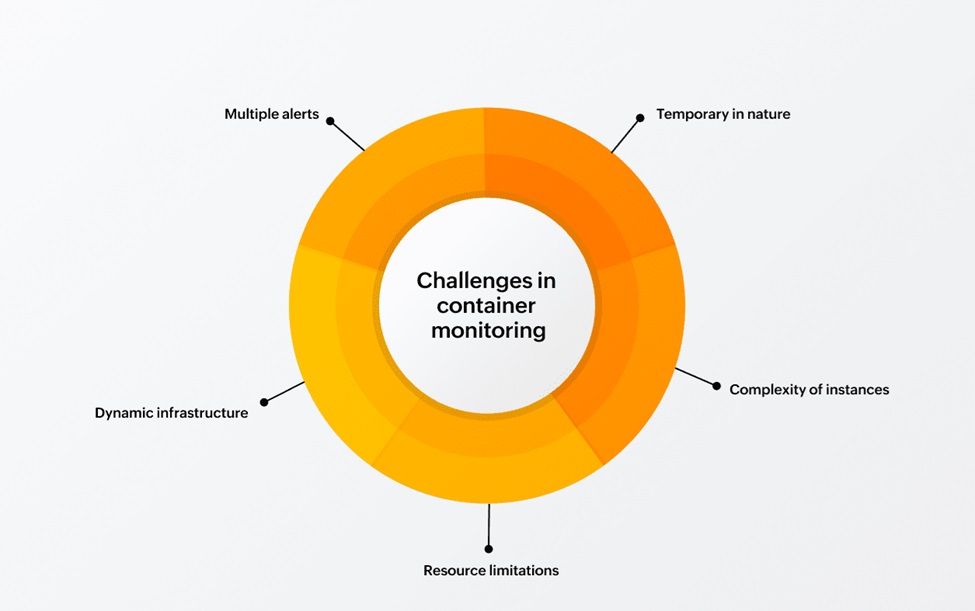
Shifting towards containerized infrastructure may appear to be a straightforward and advantageous move for businesses; however, it also brings a host of challenges.
- Temporary in nature: Capturing and analyzing data before containers disappear is challenging due to their ephemeral and short-lived nature.
- Complexity of instances: Identifying which containers are causing performance issues becomes difficult with numerous container instances running concurrently.
- Resource limitations: Monitoring the usage of physical hosts' resources becomes complicated and can cause performance issues when sharing critical system resources, such as CPU, memory, or disk space, among multiple container hosts simultaneously.
- Dynamic infrastructure: Tracking performance in a distributed environment where container instances are spread across an organization, like in microservices architecture, is complex, making it challenging to perform horizontal or vertical scaling.
- Multiple alerts: Dealing with a large number of alerts generated by various container resources can cause unnecessary stress for administrators and result in crucial issues being overlooked.
IT administrators require a monitoring solution that can effectively manage the dynamic and distributed characteristics of containerized applications. Although open-source tools, like cAdvisor, offer container metrics, they also have drawbacks, like limited data storage and a lack of advanced features and integrations. For more complex container environments, utilizing a third-party container monitoring solution, like ManageEngine Applications Manager, is recommended.
What are the key performance metrics that should be monitored in container monitoring?
There are numerous metrics that need to be monitored in containerized infrastructure due to its complex and ever-changing nature. Below are some key metrics that should be monitored and how Applications Manager's container monitoring features aid you in monitoring them:
Health and availability
Ensuring high availability for your container is a crucial aspect in monitoring container performance. With numerous containers hosting multiple applications in a containerized environment, it's essential to ensure that your container is operational and running smoothly to maintain business operations effectively.
Applications Manager can easily monitor container health and availability around the clock. Instant notifications are sent out in case of downtime or anomalies, allowing you to address any issues quickly and restore normal operations.
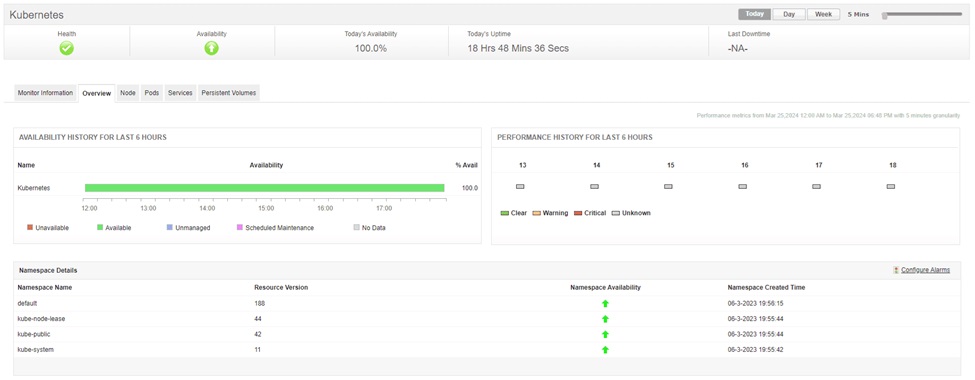
Resource utilization statistics
Containers are platform-independent and can be deployed anywhere, and resource allocation is a critical factor in determining the number of containers that can be deployed on a host system. It's important to monitor and manage the resources allocated to each container to ensure the application code running on that container is performing optimally. Failure to do so can negatively impact the performance of the application.
Applications Manager allows you to monitor host-level metrics in real time to gain insight into resource utilization performance. It monitors CPU, memory, and disk usage and sends alerts when any metrics show abnormal values. This helps you identify issues and make informed decisions about adjusting resources for smooth container deployment.
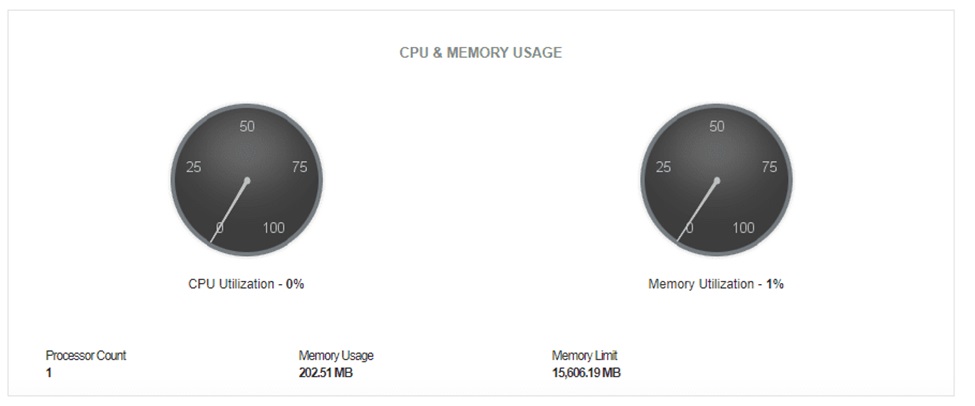
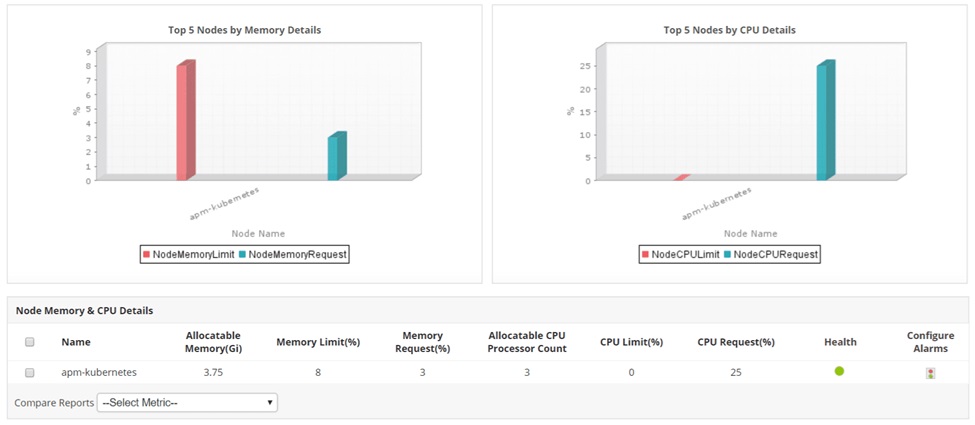
Network statistics
Network I/O is essential for monitoring containerized applications, especially those that interact with the internet, like databases, cloud services, or external APIs. These containers communicate with different applications and user sessions, leading to an influx of network traffic from various sources. This can result in a strain on system resources, affecting the performance of the containers. As multiple applications run on different containers, analyzing the network I/O of each container is crucial for balancing traffic distribution and allocating resources effectively to ensure optimal application performance.
Applications Manager makes it easier by continuously monitoring the data flow of your containers on the network in real time. It evaluates network performance by monitoring important metrics, like bytes sent or received and I/O reads or writes, and offers information on the number of network packets dropped during data transmission. This allows you to understand the workload on your container host and make adjustments to balance incoming and outgoing traffic, minimizing delays in response times

Container instance monitoring
The main components of a typical container infrastructure are images and instances. The container image contains all the necessary components for your applications and acts as a template for creating containers. Container instances are what actually run your applications, and they are created and launched using container images through a container engine.
Monitoring container instances is crucial in a container infrastructure since they host multiple applications that rely on them for proper operation. While terminology and concepts may vary depending on the container platform used, it's important to closely monitor the performance of container instances to guarantee containerized applications run smoothly.


Applications Manager helps you gain detailed insights into the performance of your container instances. It sends immediate alerts if any instances are not functioning properly and are affecting application performance. By monitoring container KPIs, Applications Manager offers comprehensive statistics on the performance of each component within your container instances around the clock, ensuring optimal and effective container performance.
Get started with Applications Manager for container monitoring
Applications Manager provides out-of-the-box support for Docker , OpenShift , and Kubernetes containers along with managed Kubernetes services such as Azure Kubernetes Service , AWS Elastic Kubernetes Service , and Google Kubernetes Engine . It provides application performance monitoring, infrastructure monitoring, and end-user experience monitoring all through a unified console.
Applications Manager effectively monitors container performance and quickly alerts users about any issues. Through comprehensive monitoring of container performance and other important metrics, you can ensure a seamless and satisfactory container performance monitoring solution for your customers with ease.
You can experience the capabilities of Applications Manager by downloading a 30-day, free trial or by scheduling a free, personalized demo with our experts.
Author Bio:
Arshad Shariff is a technical content writer at ManageEngine, a division of Zoho Corporation. He actively contributes to content on the application performance monitoring domain within the IT Operations Management suite. He delivers content through user guides, blogs, articles, and webpages that are simple to comprehend for readers with ease.

